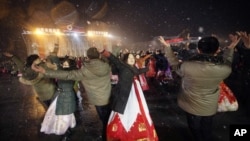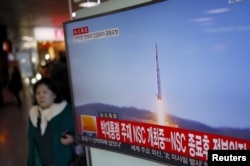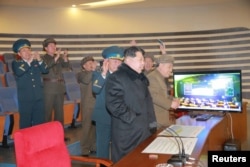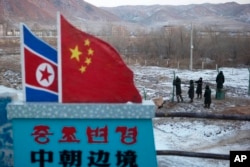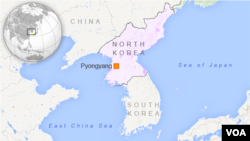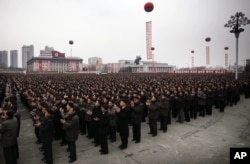North Korea’s defiant stance in the face of international condemnation over its rocket launch Sunday and its nuclear test last month are in some ways strengthening Kim Jong Un’s position at home and abroad.
Domestically, the young leader is portrayed by the North’s tightly controlled state media as a strong leader defending the country’s sovereignty against hostile American and South Korean forces.
And Sunday’s rocket launch is described by state media outlets as a great technological achievement by a rapidly advancing nation that fills many North Koreans with pride.
Official media have published interviews with North Korean citizens praising the launch as a symbol of technological progress, however it is impossible to gauge the actual domestic support for the impoverished country's ambitious nuclear programs and missile launches.
The U.S. Joint Space Operations Center said North Korea's rocket launch put two objects in orbit, but it is unclear if either is sending out signals.
No signal has ever been detected from a similar North Korea satellite, launched in 2012, which orbits the Earth every 95 minutes. Pyongyang has said the 100 kg, metal “satellite” was equipped with cameras to send images back to Earth.
The United Nations Security Council Sunday condemned North Korea for testing ballistic missile technology under the guise of a satellite launch that contributes to the “development of nuclear weapon delivery systems.”
U.N. Security Council resolutions have banned North Korea from developing nuclear weapons and ballistic missile technology and have imposed four rounds of increasingly stronger sanctions since 2006.
Defiant abroad
Pyongyang’s recent rocket launch and nuclear test sends a clear message to the international community that North Korea will not give up its nuclear deterrent.
In 2013 North Korea adopted the “Byungjin” (parallel development) policy of "economy and nuclear weapons" designating both as essential goals to maintain the country’s independence.
For the ruling Kim Jong Un family, the fall of Moammar Gaddafi of Libya in 2011, after he gave up his country’s nuclear weapons, was a cautionary tale that solidified their uncompromising nuclear position.
“I don’t think any kind of sanctions or anything else, other than force or some internal revolutionary change in North Korea, would get them off this track. It’s part of their identity,” said Daniel Pinkston, a lecturer in international relations with Troy University in Seoul.
Demand for sanctions
Following Sunday’s controversial launch, Washington and its allies reiterated demands for harsh economic sanctions that would impose real economic pain on North Korea by restricting shipping, aviation, and trade.
China’s, the North’s key economic benefactor, is reluctant to go along with punitive measures that could destabilize the region.
Beijing reportedly only supports sanctions on the transfer or sale of military equipment or other items directly related to the North’s weapons program.
And it wants all sides to exercise restraint and resume international talks to address a peaceful resolution to the North Korean nuclear standoff.
However, the Xi Jinping government is being seen as increasingly impotent and unable to exert any influence over its ally.
The Kim Jong Un government announced the planned rocket launch on the same day China sent envoy Wu Dawei to North Korea last week.
Even many Chinese see Pyongyang’s disregard for Beijing as humiliating.
“There’s criticism domestically, particularly online of Chinese saying, 'You know, what is going on? And how do we let the tail wag the dog, and how do we let our much weaker [and what] should be subservient ally get away with this stuff?' ” said John Delury, a China and North Korea analyst at Seoul's Yonsei University.
Arms race
The United States and South Korea issued a statement soon after the launch, announcing they would begin formal talks about deploying the sophisticated Terminal High Altitude Area Defense system (THAAD) to the Korean peninsula.
Japan also said it is considering THAAD to enhance its defenses. The North Korean rocket on Sunday flew over Japan's southern Okinawa prefecture.
THAAD is designed to intercept and destroy ballistic missiles during their final, or terminal, phase of flight. It has so far proven effective against short- and medium-range ballistic missiles.
China has voiced opposition to a further military buildup on the Korean peninsula and particularly to the THAAD system, whose radar could penetrate Chinese territory.
On Sunday Beijing’s foreign ministry said China is "deeply concerned" over the announced negotiations and said the missile defense system will escalate tensions on the Korean peninsula and in the region.




